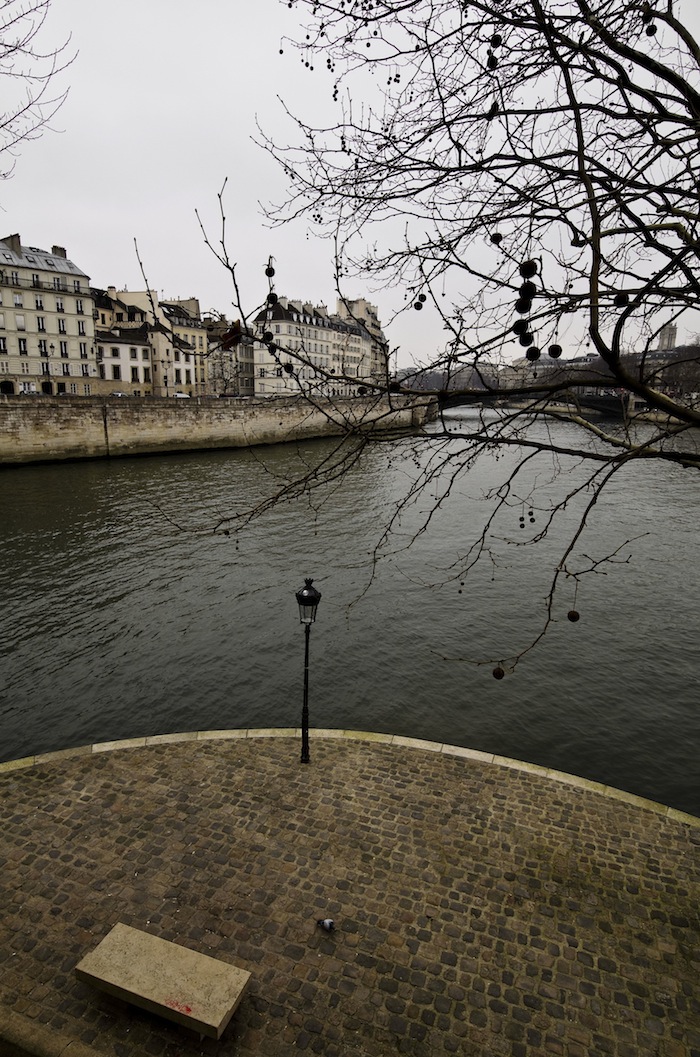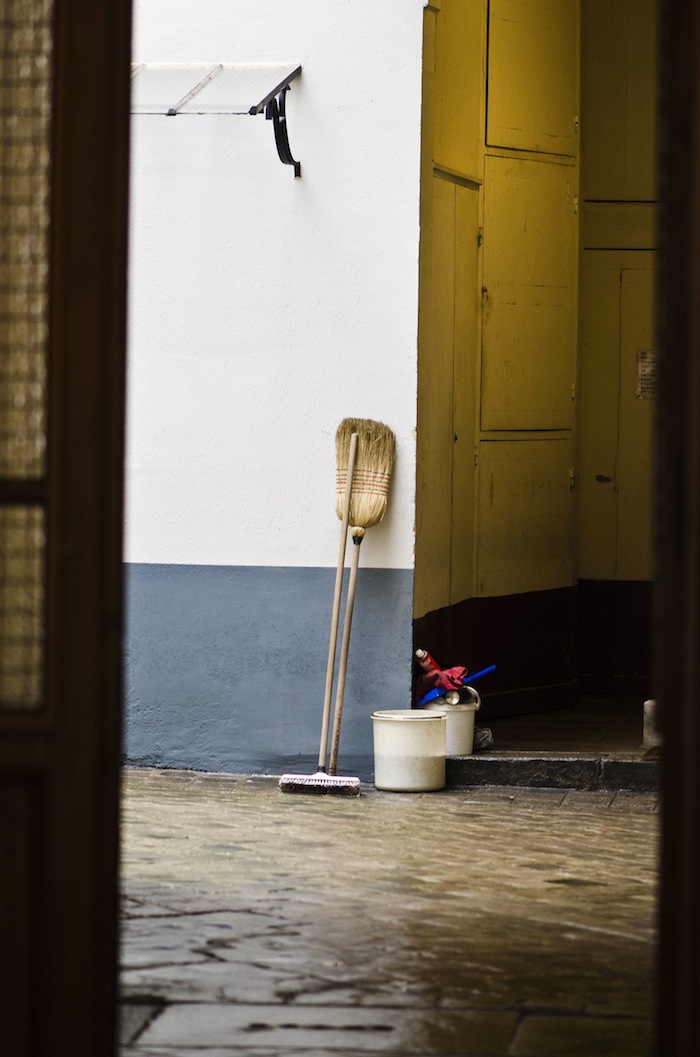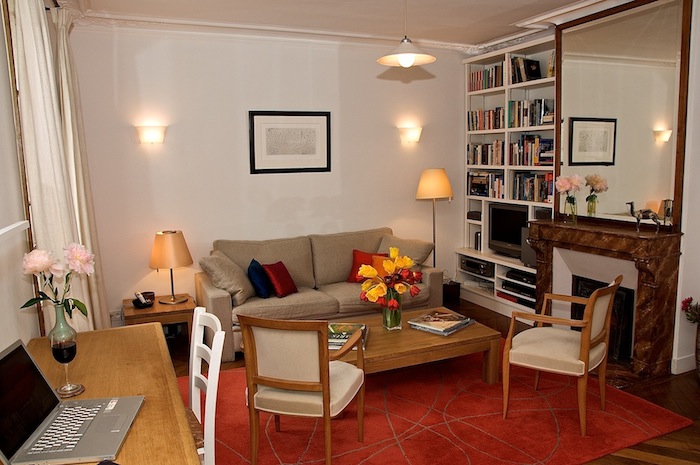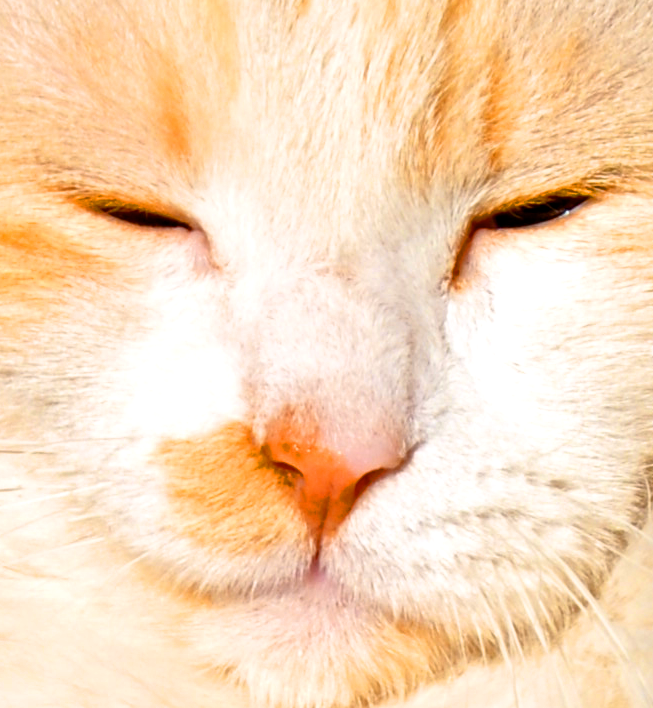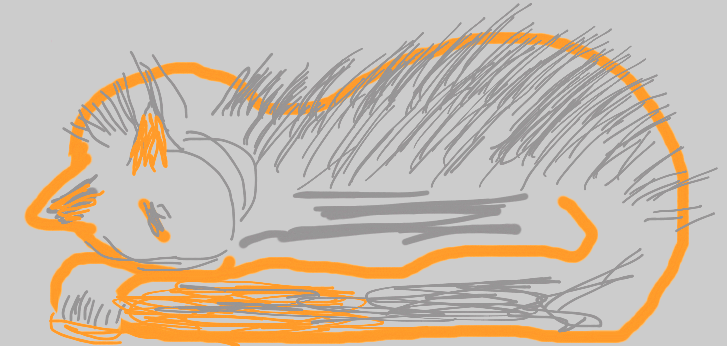The People of the Book
 03.15.2011
03.15.2011 From Rue Lagrange, we turn a corner. Suddenly, Notre Dame looms like a great ship before us, directly across the Seine. We pass the Square Réne Viviani, named for a WWI-era French prime minister, but once the garden of l’Église St-Julien-le-Pauvre, where St Thomas Aquinas, Dante, Villon and Rabelais all prayed, in the 13th, 14th, 15th and 16th centuries.

Here we are at 27 Rue de la Bûcherie, in front of this odd little bookstore that is so numinous for us. Shakespeare’s portrait is painted twice on the wall outside. Two young Americans sit at a table outside intently chatting (I hear their accents as we pass).
Out here on the paving stones between the store and the Seine is where Richard read his poems one day in spring of 1997 when we were here on our honeymoon. In 2006, on an evening when we’d just arrived in Paris, the two of us read poems together in the small intimate room upstairs.
I remember the dazzling warmth of Sylvia Beach Whitman, who had just taken over ownership of the bookstore from her father, George Whitman. She was like a fairy, delicate, blond, and full of light. Though she seemed far too young to run a bookstore, it was clear she would be very good at it.

This year, we enter as if visiting an old friend in our home town—Paris is our home town now. It’s 8:30 p.m., and chances of Sylvia being here this late are slim. But there she is to the left of the door, small, blond, radiant as ever. We exchange greetings, chat.
I ask her about my gift certificate. She dashes back to her office in the antiquarian book room, and returns: here it is, converted from dollars to Euros. Six weeks I’ve waited, gathering a list of books, savoring the thought of spending the goodbye gift from my writers group in Los Angeles. It’s a hefty amount.
But first Richard and I must sniff around this rabbit warren of a bookstore—a warren for enchanted rabbits. In the front of the store to the left of the cashier, are books about Paris and France. Here I find Ernest Hemingway’s The Moveable Feast. But no Montaigne.

Sylvia, all in black, leggings and a long sweater, searches through the section on France. While she is looking, I remember bookstores where I’ve worked: The Tides in Sausalito, California; Harvard Bookstore in Cambridge, Massachusetts; and Rizzoli Books in New York City. I think that in a former life I was—not the owner of a bookstore—but a bookstore itself.
Sylvia says she’ll be right back. She thinks there is a volume of Montaigne on hold, and Voila! she returns with The Complete Essays.

I move on to the next room, the poetry section. I search for Dorianne Laux’s The Book of Men, and Susan Howe’s That This. No luck.
In the fiction section, I strike it rich. Here is Mikhail Bulgakov’s The Master and Margarita; Jean Rhys’s Wide Sargasso Sea; Leonardo Sciascia’s The Wine Dark Sea, and Andre Breton’s Nadja.
And here are a few volumes of The Paris Review Interviews. I select Volume II, with interviews by James Baldwin, Toni Morrison and Alice Munro.
In the France section, I find Paris Metro Tales, translated by Helen Constantine, and the recently published, How to Live; A Life of Montaigne In One Question and Twenty Attempts at an Answer, by Sarah Bakewell.
I find Richard seated in the next room on a red theater seat, a huge book on the history of photography open on his lap.
“You pick a book that you want too.”
“No,” he says, “This is your gift. I don’t need to buy any more books.”
He is engrossed, which gives me time to sit on a ledge in the fiction section and read a bit from each book. Yes, the various recommendations from friends and book reviewers were all good.

A young black-haired couple speaking what sounds to me like Japanese stands nearby discussing choices of books.
Another couple in their 40s pokes through the France section speaking what might be Norwegian.
An Englishman talks with Lauren at the cashier's desk.
The sweet music of French is all around us.
At the counter, Lauren rings up my purchases, and asks me if I’d like my books stamped. Bien sûr! The stamp is a portrait of Shakespeare with the name of the bookstore and Kilometer Zero Paris in a ring around it.
I order Dorianne Laux’s latest and Pascal Mercier’s Night Train to Lisbon. She hands me back my gift card. Half the credit amount still remains. Oh, how rich I feel!
In the window I notice a stuffed crow.
“….for there is an upstart crow, beautified with our feathers, that, with his Tygers heart wrapt in a Players hide, supposes he is as well able to bumbast out a blanke verse as the best of you…”
We walk out of Shakespeare & Company, in my right hand a big brown bag with nine books. Richard takes my left hand and chuckles, “You’re so happy with a stash of books.”
I send a thank you over the Seine, across France, sailing over the Atlantic Ocean, flying over the North American continent all the way to Los Angeles to Anna, Cassandra, Dawna, Diane, Jennifer, John and Jon.
They—like Sylvia, like the authors she carries, like her father, like my mother who read to me as a child and is the greatest reader I know, like the voices already speaking to me from the big brown bag—are my tribe, the People of the Book.
 Paris,
Paris,  Shakespeare and Company,
Shakespeare and Company,  books,
books,  reading in
reading in  Paris Life
Paris Life 







